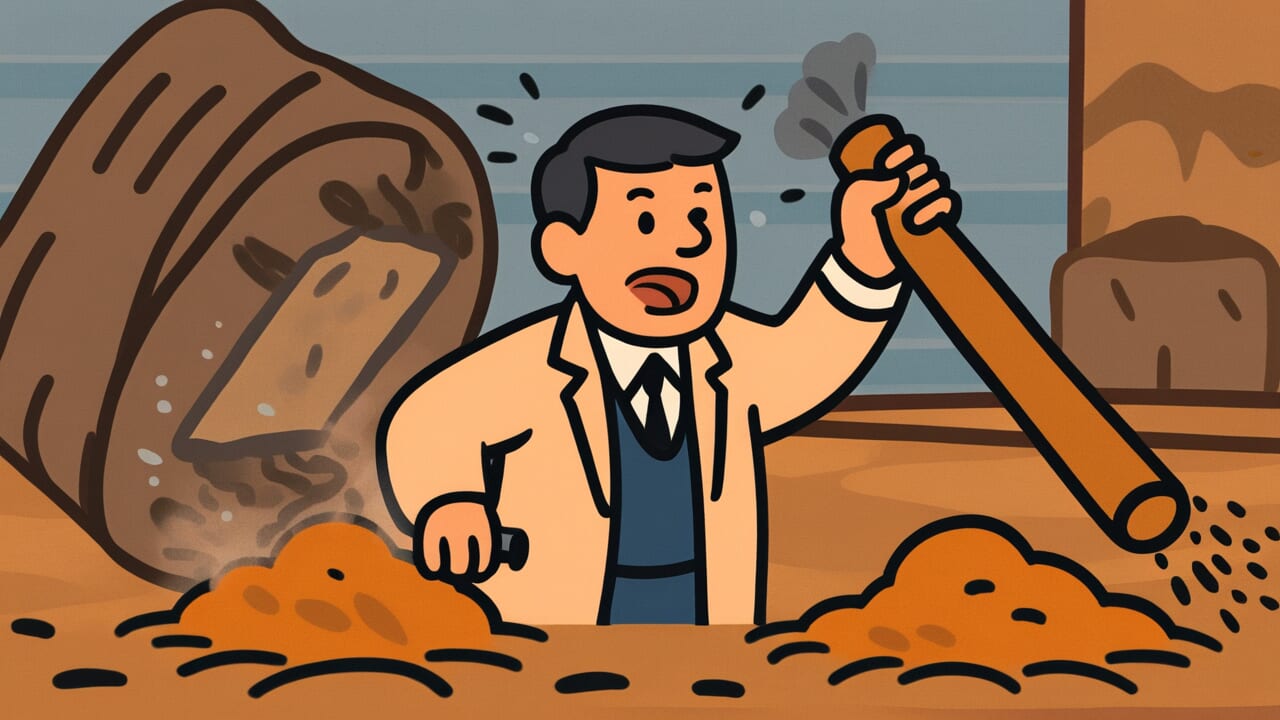How to Read “The more you stir filth the more it stinks”
The more you stir filth the more it stinks
[thuh mor yoo stur filth thuh mor it stingks]
All words use standard pronunciation.
Meaning of “The more you stir filth the more it stinks”
Simply put, this proverb means that digging deeper into unpleasant situations often makes them worse.
The literal words paint a clear picture. When you stir up dirty, smelly material, it releases more odor. The deeper message warns us about meddling in messy situations. Sometimes investigating problems or gossiping about scandals creates bigger troubles than ignoring them would.
We use this wisdom when dealing with workplace drama or family conflicts. If coworkers are arguing, jumping in might escalate the fight. When old family grudges surface, asking too many questions can reopen wounds. Sometimes letting sleeping dogs lie prevents unnecessary pain for everyone involved.
What’s interesting about this wisdom is how it challenges our natural curiosity. Most people want to understand problems completely before moving on. This proverb suggests that complete understanding isn’t always worth the cost. Sometimes peace matters more than knowing every detail about what went wrong.
Origin and Etymology
The exact origin of this proverb is unknown, though similar sayings appear in various forms across different languages. The concept connects to ancient agricultural societies where people dealt with actual filth regularly. Farm communities understood that disturbing waste materials released stronger odors.
During medieval times, when sanitation was poor, people lived with constant reminders of this truth. Stirring up refuse piles or cleaning out animal pens taught practical lessons about leaving some things undisturbed. These daily experiences made the metaphorical meaning obvious to everyone.
The saying spread through oral tradition before appearing in written collections of folk wisdom. Over centuries, it evolved from practical farming advice into broader life guidance. The core message remained unchanged even as societies moved away from agricultural lifestyles and into more urban settings.
Interesting Facts
The word “filth” comes from Old English “fylth,” meaning foulness or corruption. It shares roots with the word “foul,” both describing things that offend the senses. This connection strengthens the proverb’s impact by linking physical disgust with moral or social unpleasantness.
The proverb uses a simple cause-and-effect structure that makes it memorable. The repetition of “the more” creates a rhythm that helps people remember the saying. This pattern appears in many folk proverbs because it clearly shows how one action leads to another result.
Usage Examples
- Manager to employee: “Stop digging into that old workplace drama – the more you stir filth the more it stinks.”
- Sister to brother: “Let that scandal die down instead of posting about it online – the more you stir filth the more it stinks.”
Universal Wisdom
This proverb reveals a fundamental tension in human nature between our drive to understand and our need for peace. Humans are naturally curious creatures who want to investigate, analyze, and uncover truth. Yet this same curiosity can lead us into situations where knowledge becomes a burden rather than a blessing.
The wisdom recognizes that some problems are self-perpetuating. When we probe into certain conflicts or scandals, our investigation itself becomes part of the problem. The act of stirring creates new complications, fresh grievances, and additional layers of mess. This happens because human emotions and relationships are fragile systems where outside interference can cause unpredictable reactions.
What makes this truth universal is how it appears in every human community throughout history. Whether dealing with village gossip, family secrets, or political scandals, people have always discovered that some investigations cause more harm than good. The proverb captures an essential survival skill for social creatures who must balance individual curiosity with group harmony. It teaches us that wisdom sometimes means choosing ignorance, and that the most mature response to certain situations is strategic disengagement rather than deeper involvement.
When AI Hears This
When people dig into messy situations, they become unwitting chemists mixing volatile ingredients. Each question asked adds heat to the mixture. Every detail examined creates new reactions. The original problem transforms into something entirely different and more toxic. What started as simple investigation becomes active creation of new complications.
Humans consistently mistake themselves for neutral detectives uncovering hidden truths. They believe problems exist in fixed states waiting to be discovered. This blindness to their transformative power runs deep across all cultures. People genuinely think their attention doesn’t change what they’re studying. They miss how their very focus feeds and mutates the original issue.
This self-deception reveals something beautiful about human optimism and terrible about human awareness. People investigate because they believe understanding leads to solutions. Their faith in knowledge as healing force drives them forward. Yet this same faith blinds them to their role as problem-amplifiers. The tragedy and comedy intertwine perfectly in human nature.
Lessons for Today
Living with this wisdom requires developing the judgment to recognize when investigation will help versus when it will harm. The challenge lies in distinguishing between problems that need attention and situations where involvement makes things worse. This skill develops through experience and careful observation of how different approaches affect outcomes.
In relationships, this wisdom suggests focusing energy on solutions rather than endless analysis of what went wrong. When friends or family members are in conflict, offering support often works better than demanding detailed explanations. Sometimes the most helpful response is simply being present without trying to fix or fully understand every aspect of the situation.
For communities and organizations, this principle applies to handling sensitive issues and past mistakes. While accountability matters, there’s wisdom in knowing when continued investigation serves justice versus when it perpetuates division. The goal becomes finding the minimum level of examination needed to prevent future problems while avoiding the maximum level that creates new ones. This balance requires patience, humility, and the courage to sometimes choose peace over complete understanding.



Comments